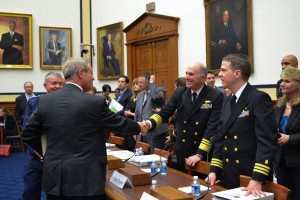WASHINGTON — Military mental health research is under pressure because of budget cuts, and while current projects are being spared, efforts to develop new treatments for mental health problems may be in jeopardy, the service surgeons general told a House panel Wednesday.
“It’s my understanding that the [Defense Department] will stop funding medical research for the rest of fiscal year ’13 and use the funds to pay Tricare providers instead,” said Rep. Joe Wilson, R-S.C., chairman of the House Armed Services Committee’s military personnel panel.
Wilson specifically asked about the military’s ability to study post-traumatic stress and traumatic brain injuries while dealing with reduced funding due to sequestration, the mandated across-the-board budget cuts affecting all federal agencies.
“We’re not going to wholesale shift money out of research on these important areas to solve other budgetary problems,” said Dr. Jonathan Woodson, assistant secretary of defense for health affairs.
But he acknowledged 2013 has been be a difficult budget year. “We’ve had to manage almost month-to-month in terms of our strategy,” he said.
Woodson said that although most DoD research projects for 2013 have already been funded and continue to run, moving forward would require “creative ways of solving budgetary problems.”
As for research within the military itself, Army Surgeon General Lt. Gen. Patricia Horoho said sequestration poses “tremendous challenges across Army medicine.”
Some projects have already lost their funding, she said.
“We’ll be focusing on ensuring that we keep our top researchers in some of the projects that we can’t fund this year,” said Horoho. “They won’t stop, but we want to maintain the talent because you can’t raise that up quickly.”
For the Navy, the potential impact of budget constraints is two-fold: “One is the dollars for funding the programs themselves, and the other would be the personnel piece that might be sensitive to furlough,” said Vice Adm. Matthew Nathan, Navy surgeon general.
So far, Nathan said, the Navy has been flexible in exempting from furloughs employees who support wounded warrior or recovering warrior programs.
Lt. Gen. Thomas Travis, the Air Force surgeon general, said it’s too early to fully understand the impact of budget cuts on research, but “it’s very worrisome.”
“At this point, my intent is to keep research and development going,” he said. “We’re just now learning so much and I think to cut off the funding at this time … would really be a shame.”

Rep. Joe Wilson, R-S.C., greats Vice Adm. Matthew Nathan, Navy surgeon general, at a hearing on mental health research in the military as Lt. Gen. Thomas Travis, Air Force surgeon general (far left), and Cmdr. Russell Carr M.D., of the Walter Reed National Military Medical Center (far right), look on.
